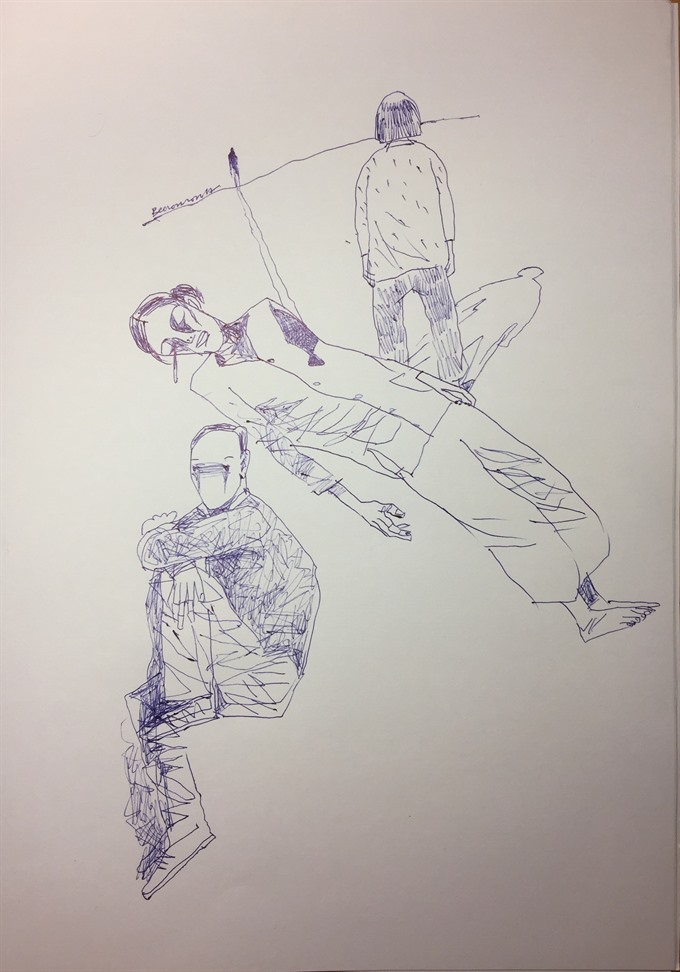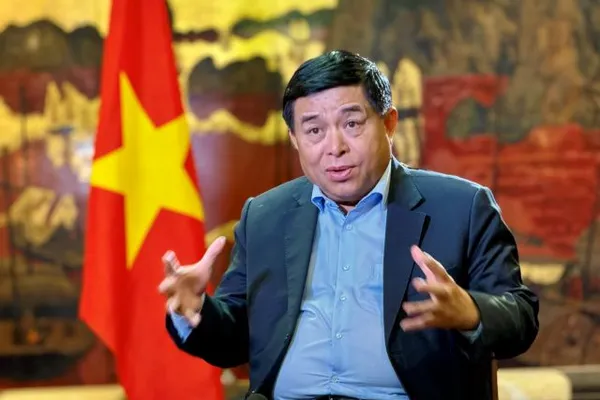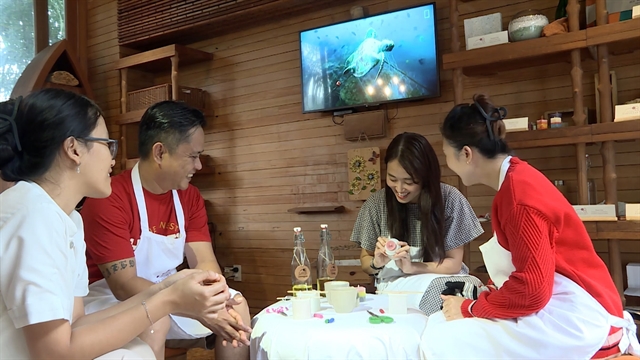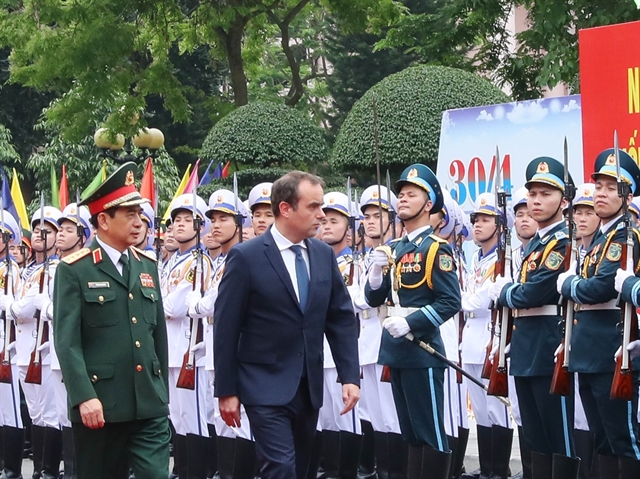.jpg)
.jpg)
A short story by Vũ Thiên Kiều
 |
by Vũ Thiên Kiều
Thức was cooking a white fish with a little vegetable oil, a table spoon of sugar and some crushed garlic. “I need these additives to make the dish tasty” he whispered to himself. He stirred the contents round and round. Half an hour later, he had made a light-yellow gruel.
Although he wasn’t much of a cook, he had tried to make a nutritious bowl for his bed-ridden mother.
“Is your father all right?” she asked her beloved son anxiously.
She had been laid low in bed for six years, putting a lot of stress on the family. While still healthy, she had been thrifty with her meager wages of less than four million đồng a month plus her husband’s five million đồng income. She sometimes saved as much as thirty million đồng per year.
* * *
Unluckily a stroke had left her totally paralysed. The family’s savings were quickly swallowed up by medical bills. With no money left to pay for treatment, she just lay in her gloomy house year after year. Two years later, Thức’s elder sister suffered from depression after she graduated from college. She only ever wanted to be alone and wasn’t much help around the house. Behind her door, she seemed to live in her own world with a malady that got worse and worse with every passing month. Therefore, Thức’s father had to work to look after four people on his own. At night he often drank to forget the harsh conditions in dire poverty where the basic necessities were lacking. Sometimes, Thức tried to seize the bottle of spirits out of his hands.
“Dad, let me leave school so I can get a job and help you,” Thức entreated his father.
“No, never! You must go to school at any cost,” he said resolutely, eyes in tears.
Meanwhile, my mother also cried. So did I.
* * *
“Is your father all right?” Thức’s mother asked him when she thought of her husband living far from home.
She waited for her son’s answer. Instead of replying, he just held her hands and nodded his head.
Thức’s father had worked far from home for two years, sending money home to cover the family’s expenses.
When young, he was good-looking and carefree. He had a lot of skills and had travelled extensively across the country before settling down.
“To be honest, your mother’s a simple girl, I love her because of her honesty and kindness,” he said to his son one day.
When Thức finished the ninth grade, his father left home to look for employment in a distant province.
“This is the only way I can pay for everything the family needs, including your school fees and your mother’s medicine. Without an education you won’t get a good job, you’ll be stuck doing manual labour like me,” he told his son before going away.”
“Where will you go, Dad?” Thức asked.
“To any place where I can find a good job,” he replied, hugging him tightly. Thức was very sad. He saw him off to the coach station.
Without him by his side, Thức had to do everything, which took up most of his free time. He would come home, do his homework, do the housework and look after his sister and mother.
Once, Thức witnessed a bitter quarrel between his family and his youngest uncle’s family. That argument raged so hard that relations were nearly broken off.
* * *
Before that day, Thức’s youngest uncle told his wife to give their old colour TV to Thức’s father because his new, fancy villa had a better one. The poor man was very happy, as his black-and-white 14-inch set had recently broken and he certainly couldn’t afford a new one. His family’s poverty had become so dire that he felt he had to pawn the TV he had been gifted. When his brother’s wife found out she flew into a rage and all Thức’s father could do to remedy the situation was borrow five million đồng and send it home to Thức so he could buy it back for her.
“Pity the man who can’t do his business honestly! Sooner or later, he will go bankrupt. How can a man who abandoned his son be respected?” she said when she received the TV.
Thức was startled. “Abandoned son?” he asked himself.
Thức burst into tears. She smiled mockingly, while her kind-hearted husband just gazed at the floor and his daughter laughed sarcastically.
Thức left their magnificent house, eyes in tears.
That was the first time Thức learned he had an elder stepbrother.
When Thức’s father was still a young husband, an argument between him and his wife’s family had driven him from home. He fell into the warm arms of a young girl. Before long, a boy named Thành was born out of wedlock.
On his way home, Thức’s motorbike collided head-on with a vehicle moving slowly the opposite direction. He was thrown into the middle of the road, his nose drenched in blood.
“Take him to hospital at once,” suggested a pedestrian.
“Tell his relatives about the accident,” chimed in another.
A few minutes later, his aunt-in-law arrived, driven by his uncle in his luxury car.
“Serves him right! Probably it happened because of his careless riding! We’d better leave this place at once. What’s the use of staying here,” remarked the well-dressed woman.
“What a dirty Buddhist!” said a motorbike taxi driver.
“I’m fine,” Thức apologised to them all.
* * *
“Is your father all right?” Thức’s mother asked him.
For more than two years, Thức’s father had been away. Previously, he usually returned home at Tết. Yet, on Tết eve this year, he did not, as he was on duty at the company. However, he sent more than 10 million đồng home.
“You should take care of the housework,” he wrote to Thức. “Most important, the sumptuous dinner in memory of our forefathers on the eve of Tết.”
During Tết, his ailed mother remained in bed. To help her miss her husband less, Thức brought a pot of yellow dwarf ochnas inside a few days ahead of Tết. Unfortunately, its blossoms turned withered just two days after Tết.
Thức was now a college junior, but his mother was still seriously ill and his elder sister even more depressed. The family’s living conditions grew worse with every passing month. Luckily, his father was sending even more money home. He seemed to send more as his phone messages for Thức grew shorter, “I’m very busy. I’ll ring you in the late evening, my beloved son.”
He waited and waited for his father’s call. Not until midnight, did he phone his father once again, in vain as the line was busy. The next morning, he received his father’s message, “I’m all right. Do your best at college. Try to look after your Mum and sister’s health. I’m about to go to work. Love you.”
He still had another year of studying, so he was up to his neck with schoolwork. In the meantime, his family’s financial troubles had worsened. Sometimes, he stained his homework with tears. A few journalists wanted to write about his great efforts to raise funds for him, but his father refused their suggestions for fear that it might harm the prestige of his lineage. Although his father’s family was poor, his three brothers’ families were so wealthy that they did not want their reputation smeared.
The only thing that assuaged Thức’s anxiety was the support of his many kind-hearted neighbours, one of whom found the phone number of one of Thức’s aunts.
“You should call her soon,” she told Thức. “Blood is thicker than water, she could help you.”
He did as was told.
“Study harder. You get what you earn in this life, lazy git!!” answered the woman.
Thức trembled. Her words hurt him deeply.
* * *
After graduating from college, Thức began working for a foreign company for U$2,000 a month. After three years of service, together with his father’s income sent home every month, he managed to save up enough to hire someone to look after his mother and sister so he could visit his Dad in the distant southern province. The poor man had been unable to go home for nearly five years.
Thức set off to meet his father immediately.
His sweetheart Trầm, a colleague two years senior to him, also wanted to go with him when he described his father’s whereabouts. “Let me go as well. I know this place because my aunt’s shrimp pond is very close to it,” she suggested. Thức refused on the grounds that the distance was far, beyond her endurance, perhaps. Regardless, she put a bundle of banknotes into his bag. “It’ll come in useful for you,” she told him in an affectionate voice.
Thức’s father had never told his son much about his job, except he worked in a vast tea-growing region, as he once had told his son. “For a state-subsidised employment programme in a large tea area, it can pay as much as ten million đồng per month. Unbelievable!” Thức said to himself. The car he was being driven in meandered among the plantations of coconut trees and green rice fields until he saw a distant mountain range far ahead.
Suddenly, Thức burst into tears.
“Keep your hair on. Just a few kilometres to go!” said the driver. “Your father will return home with a hearty welcome from the whole family after this trip. Why are you crying?” he added. After nearly a day driving together, he felt sympathy for Thức.
“You’re right. I’ve made everything ready for this trip. Even money to compensate for Dad’s breach of contract so he can leave with me,” Thức whispered to himself.
“Dad, I’m about to see you thanks to the money you sent home regularly. You’ll soon come back to the warm arms of Mum and sister,” he whispered.
The car moved up and down along the earthen path. After that it went around Trầm’s family’s shrimp pond, who had come home on her own a few days before. A hedge of flowery shrubs led to a gate which had been left wide open. He went through in onto a footpath lined with yellow rose bushes.
“My Dad’s workplace! It’s just a big cemetery!” A big wooden plate bearing the line Trịnh Family’s Burial Ground could be seen high across the gate. “No doubt, Dad is only its caretaker,” exclaimed Thức. He came close to the two nearest graves. One of their tombstones read:
R.I.P.
Trịnh Xuân Thể
Born:1952
Died: July 15, 2012
“Oh dear, Dad passed away on the day I had the accident on my way home from my aunt-in-law!” Thức shouted. He nearly fainted, eyes in tears.
“Bow down in front of Dad’s photo, dear brother. He died almost four years ago,” said a man of thirty standing behind him. He touched Thức’s shoulder lightly.
Thức turned back. The middle-aged man looked like his father, but was far younger, of course. His eyes were also brimming with tears.
“So, you’re Trịnh Xuân Thành, aren’t you?”
“Yes, right, my brother.” He took a booklet out of his pocket then gave it to Thức. “Read it,” he added.
Thức opened the small notebook.
“My God, it’s Dad’s handwriting!” Thức exclaimed.
My beloved son,
Today I’m too tired to do anything else due to my serious disease. Over the past few months Thành and his wife have looked after me, yet it seems to have been in vain. I’m about to depart you all for good: my beloved children and your Mum. My heart aches. My days are numbered. I recorded my voice at Thành’s request for you all to hear again and again. Thành loves you all very much. He’s taken care of everything. Thức, do well at school and look after Mum and your sister. Later, if your uncles and aunts have difficulties, do your best to help them, on my behalf, although they’ve treated us poorly.
I’m so proud of all my children. I love you all very much.
Farewell to you all.
Trịnh Xuân Thể
Thức tightly hugged Thành, who stretched his arms wide to welcome his younger brother.
“Thức, let bygones be bygones! You’d have done for me what I did for you,” Thành said to his stepbrother.
After his father’s death, Thức inherited his great generosity. He felt no animosity towards his wealthy aunts and uncles.
With their eyes full of tears, both of them knelt down in front of their father’s grave.
Suddenly, a woman’s soft hand touched Thức’s shoulder. It was Trầm. At once, she also knelt down beside the two brothers, eyes filled with tears.
A thin wisp of fragrant smoke curling upwards from the burning incense wafted to the three people, almost like a divine blessing for them.
Translated by Văn Minh
The Vietnamese version of the short story was published in Văn Nghệ (Literature and Arts) newspaper on August 19, 2017
.jpg)








